Transcription
Reply ID: tkhd
buhogrunon: Thanks for your insightful rebuttal! You make some very good points, and I'd be lying if I said that I didn't profess the same objections at various times in my life. I grew up with God - then fell away - became 'spiritual' - the agnostic - then fully apostatised and became a staunch atheist for a number of years so I understand the logic of what you say, and your logic is flawless if you accept (or deny) certain truths and build it from there.
But let me play the advocate for a minute; "a community can be brought together under the same sets of moral and values..." is a secular argument. But who sets the standard? Who says what is right and wrong? And if he says so - how many people in that community - nation - or world will really, truly hold what he proclaims to be wrong as wrong. How many will avoid it as long as he possesses sufficient force to deter that type of behaviour - but then when that force is diminished - or removed - (or when they feel they can evade it) will resume doing what they never felt to be wrong anyways? Isn't it more likely that any number of people will have their own personal interpretations of what 'right' and 'wrong' is? That will devolve (in most cases) more or less to what people want to do or believe.
You mention the law system. America has a 2.4 million man prison system. Above 7 million on probation or parole. This is just currently, not counting the recently released, or recently off paper. So with a bang of a judges gavel, do you feel this brings a community together. Most of us despite this system as the very police and judges violate the very law they condemn us for violating, tell us they believe in, and expect us to believe in. Not to mention out families (who are completely innocent of wrongdoing) who are extorted or threatened by law enforcement officials or the fact that the standard of morality (the law) is arbitrarily applies - (I could cite all day long about unprosecuted government corruption and crime).
Another thing is that secular definition of "same sets of morals and values" never stays the same! It's constantly shifting and changing. It's like striving to conform to your beliefs and values to a system that in 10 years will ostracise you for holding. Example: Adultery was a prisonable offence in Texas less than 10 years ago - sodomy less than 20 years ago - now to even speak against either will get you shrugged off or labelled as hate speech.
The only constant seems unbridled tolerance on the relativism argument. You have your truth, I have mine. You have your 'good'... and I have mine. But how does this work, when people's definitions of 'good' can vary so significantly? Man, a lot of lies and calumnies are told about the Nazis. But that system - though horribly wrong - also makes logical scientific sense. For the "greater good," we'll force evolution. Eugenics. It's wrong that some people are born dumb or diseases, or with genetic predispositions to drug addiction/alcoholism, homosexuality, promiscuity, criminality, etc... is that not unfair? For the good of humanity can we not sterilise them or dispose of them? See the logic?
Or Richard Dawkins. Brilliant scientist. Genuinely wants the best for humanity. Also genuinely thinks religious people are insane and believes that parents who teach their children about God should be incarcerated. These are extreme examples. But they illustrate a principle that holds true in less extreme, more subtle cases as well.
A Christian believe in helping the poor, feeding the hungry. A Hindu believes that all pain and suffering is the result of past sin and karma working itself out. To them, it is a highest good to allow yourself to starve to death paralysed on the street - as it will be less misery you have to experience in a future life. How will the two standards of morality exist in one community? Or set government budgets? With feeling animosity and/or resentment that on side's taxes are supporting something the other completely disagrees with? In fact, the very nations of India and Pakistan were formed when the community of Muslims and Hindus ripped the former India in two because they could not co-exist. All the Muslims forcibly migrated to the Western half (now Pakistan).
But there are so many lesser examples. Redistribution of wealth? Immigration? Access to health care? Polygamy? Child prostitution? Corporal punishment? Execution? etc... What's 'good?' What's a 'human right?' Even though the law says one thing, we see opposition to that law and still disagreement. Forever shifting and changing.
Religions - Christianity, Judaism and Islam - say what you will - have they not outlasted any government on the world scene today? All of 'em. And their standards of right and wrong are outlasting any legal definitions of such. But we'll see who stands the test of time. The Church has 2,000 years so far.
So much I agree with you, I don't even know where to start. I know I'll never get across half the stuff I want to day. Well, modern day Christianity teaches so many aberrations and 90% are unlike anything that was taught from the beginning. But Catholics and Eastern Orthodox stay grounded. There's continuity. The doctors and fathers of the church, from the first century through today are still read and as relevant as they always were, and you're absolutely right about the "higher morality." St. Catherine of Siena - (13th century Italian Saint, mystic, stigmatist and doctor) explains perfect and imperfect love like this; 'the most imperfect love of God and neighbour is when you do good out of fear of punishment or Hell. Next come 'mercenary love' - a little more perfect but still imperfect. It's when you do good out of a desire for rewards - either temporal or spiritual - or eternal - "Heaven" - but these motivations are but steps to become more perfect. The highest form of love of God is when we go good not out of fear or promise of reward, but simply because we love who and what God is - pure love, mercy, compassion, loyalty, courage, etc... When we see God in everyone and everything and desire to selflessly serve Him and give Him our all simply because He is who He is. Like Mother Teresa. Saw Jesus in everyone. Dedicated her whole life to feeding and bathing dying lepers in India. Never married or sought riches or comfort. Never owned anything, all her nuns had like 2 'habits' of clothes - no private property, no spouses... a bucket of water to bathe with a day - 2 meagre meals. Their whole life was dedicated to collecting these dead and dying maggot infested bodies off the streets and nursing them back to health or comforting them until they died. Never expecting rewards or fearing punishment... look how God poured His ability into such pure souls... millions of dollars of donations flooded in, allowing her order - 'The Missionaries of Charity' - to feed, heal and teach more and more. She didn't even initially want a telephone at her motherhouse for fear the luxury would corrupt her nuns. The Pope presented her with a convertible an admirer donated for her use... she immediately raffled it off and fed the hungry with the funds, kept no funds on hold. Wanted no rewards. That's "higher morality." She spoke like 6 languages... educated herself more and more to increase her ability to help the needy. There are so many saints like this that accomplished almost unbelievable feats of charity with their lives. They all attribute the driving force within them to God.
Which brings me to your next point. 10 years ago your main statement was my main argument against religion. That instead of doing something to fix problems - what the heck good is praying about it gonna do? Seemed like a cop-out. An excuse for apathy and doing nothing. But it was not so from the beginning. Heard the Latin phrase "ora et labora" - pray and work. Pray as if all the results depended on God and work as if all the results depended on you!
The Catholic understanding is deep. And makes perfect sense. (The theology is built on Aristotelian logic). You'd never know it until you start learning it. But tell me if this doesn't square with everything you stated about the doctors, human actions...etc...
Anyone can pray. God doesn't want to do all the work though He could. He wants us to show Him we care. He wants us to share the redemptive process of creation. We are His hands and legs and mouth on this earth. He created us to act. He works, and lives, through us. In us. He said we'd do 'greater work' than He did! For example, say you pray for Him to heal malaria-stricken kids in Africa from dying. He also wants to help them. But how bad do you want it? How close is your will to His will? Will you let Him work through you?
If, in answer to your prayer you get a promotion at work and you now have a $100,000 year job, will you care enough to donate money to those kids... or buy a shiny car and nice clothes? If so, why should he pour the ability into you to effect that will when your resolve crumbles in the face of so little temptation? What does that say about your prayer expressing your desire to save those kids? Or suppose you pass that tests of will and He floods you with brilliant insight, understand, discipline and focus? Will you put yourself through medical school to do something... or learn to be something else to advance your own agenda?
God gives us all different gifts. Smarts, verbal eloquence, family connections, genetic abilities that we could in no way merit or acquire had we been born without them... what do we do with them? Advance His agenda of love for Him and each other - or use it to serve ourselves in hedonism and dissipation? Belief in God hasn't detracted from the value of human actions - it enhances them. We believe He is the source of spiritual strengths such as discipline, understanding, fortitude, hope in the face of overwhelming odds, patients, love, etc.. He will, and can, pour these graces - and Himself - into your soul - but it's then within your power to use them... or He can take them. You can oppose Him and be given over to your passions, fears, crippling depression, addictions... He can remove His presence from within you and strip you of your ability to do anything... or not. In His providence He can leave you with the ability to effect your evil will so that we can see and detest those errors and turn from them.
The medical team you mentioned? He gave them the ability. They took the potential that God gave them and developed it into an actuality. Brought forth the fruit of healing. The healing would not have occurred without a joint effort on behalf of God and man. Just like Christ didn't fall out of the sky, but came through the Blessed Virgin. God offered. She accepted the mission and the grace given - and remained faithful - and brought forth Christ. Likewise, He's pouring out Grace and looking for vessels like you and me to pour fourth potential. But will we develop His grace and bring it to fruition or will my desire to please self, neighbour or vanity cause me to misuse the gifts he gave me?
Prayer is to prepare us for action. Not substitute for it. Prayer is to enable us to do what willpower alone can't do - not substitute for it. Even then it's difficult. Look at Christ in the garden of Gethsemane. Scared to death. He couldn't fulfil it on his own. He emptied Himself of the power of God. He had to pray 3 times for the strength to do what He couldn't. The Father sent an angel to strengthen Him. He still has to use that grace to walk, and act.
A lot of churches since the Protestant Revolt (1517) teach conflicts and contradictory doctrines. And don't make sense if you think them out. Most don't even believe what the Protestant founder - Martin Luther - taught. I study all that but find that a lot of arguments against religions are correct when they argue against the Protestant paradigm. I wrote off religion because of it, too... but like you, I see things as messed up, believe we have the ability to do something about it, think we should be doing something about it... and want to do something about it. Just you're probably a way better person than I am... I've given up, become cynical, doubted the potential for change is possible and even advanced the agenda of the very I hate. You probably love God, but don't even know it. You probably see loyalty and know that it is good, without even understanding that is a part of the essence of what God is. Pure light. Pure goodness.
But without unity our understanding get blurred.
Catholic definition of presumption: "Thinking God will bring about His goodness without your effort or thinking you can bring it about with your own capacities without Him."
Thanks for writing.
Chris Hall #1565195
Ellis Unit
1697 FM 980
Huntsville, TX 77343
Other posts by this author
|
2018 feb 12
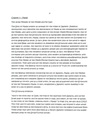
|
2017 dec 21
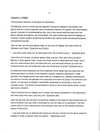
|
2017 nov 28
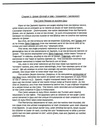
|
2017 sep 2
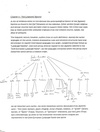
|
2017 aug 20
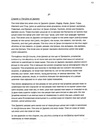
|
2017 jul 23
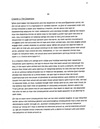
|
More... |
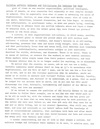

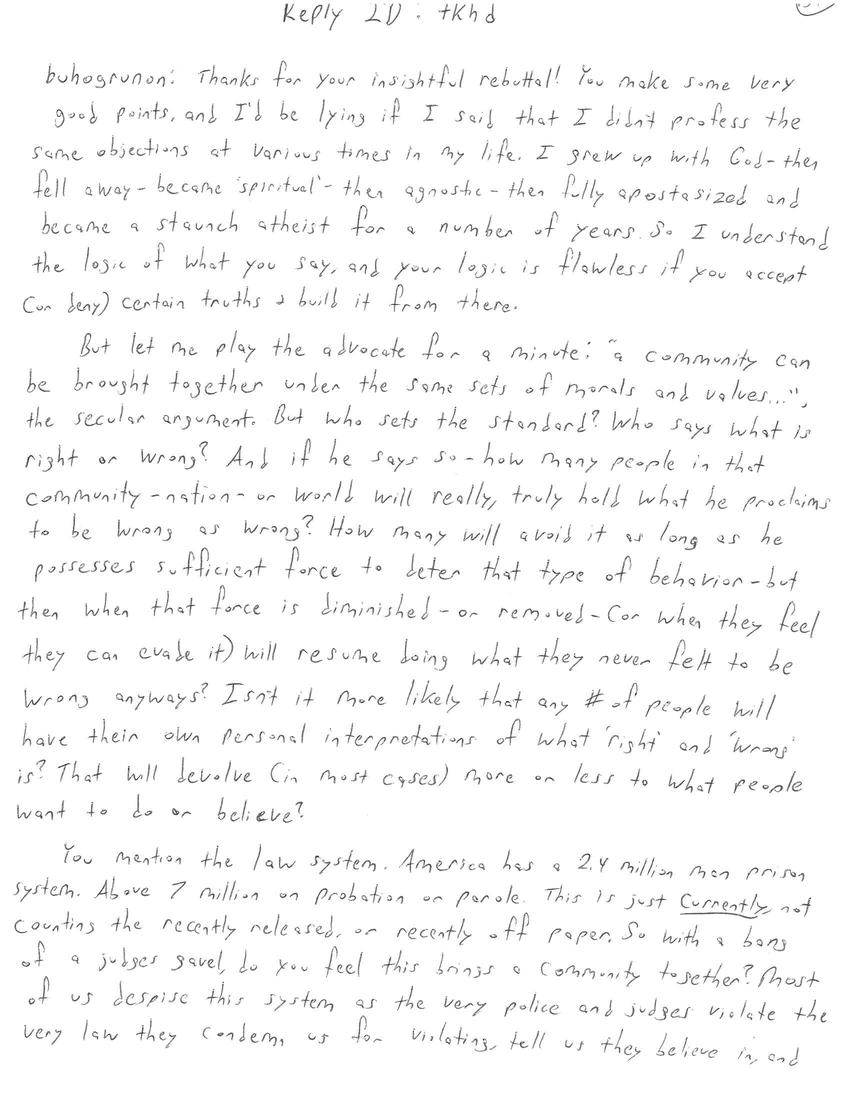
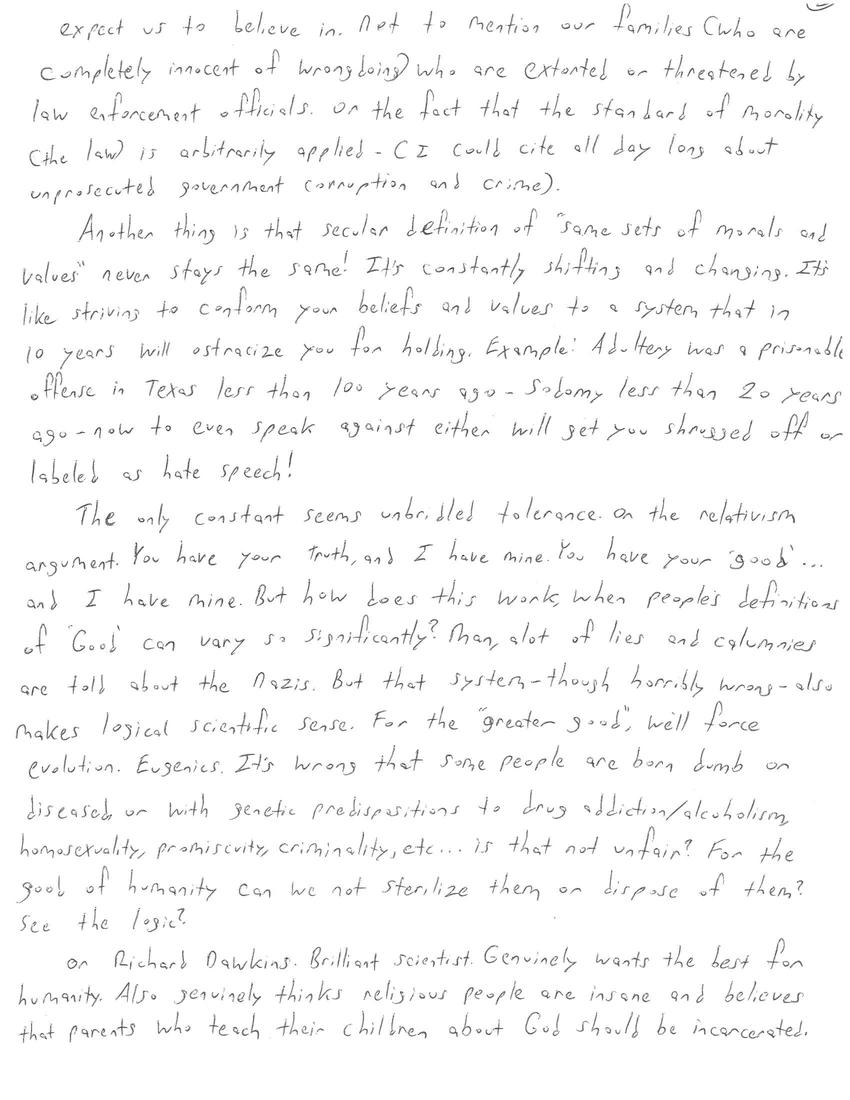
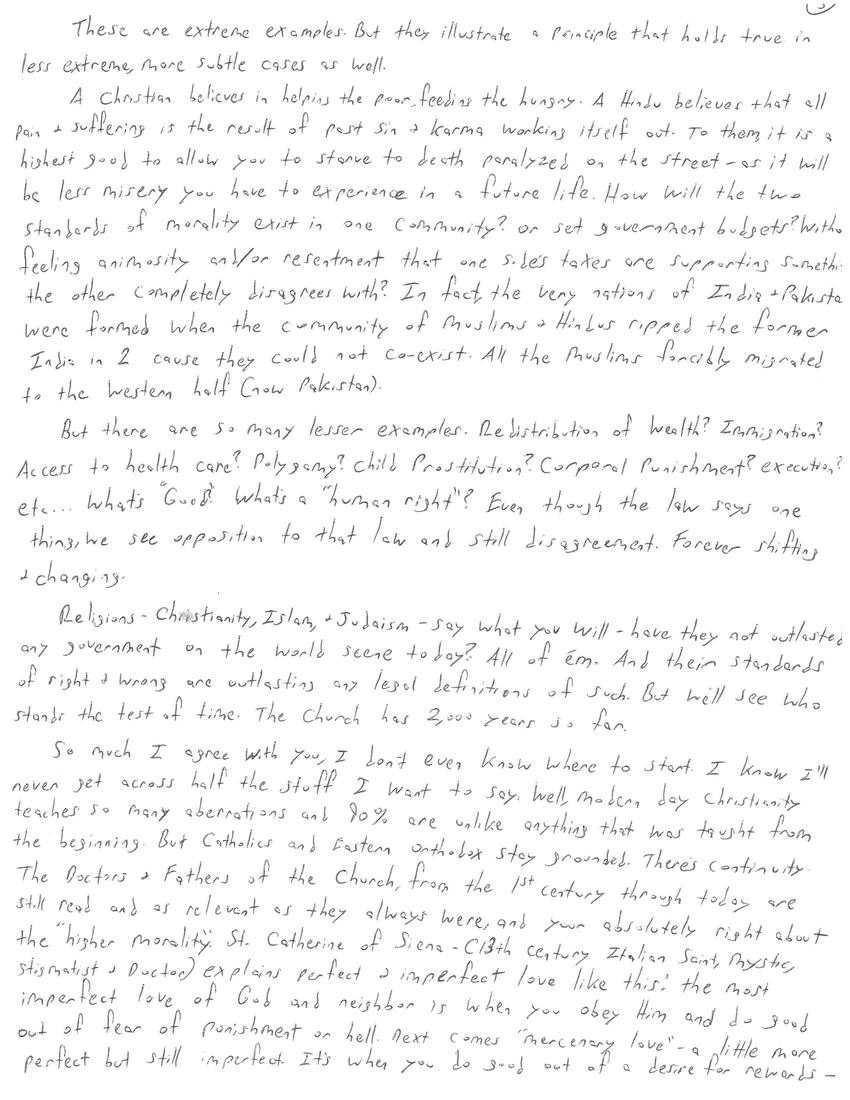
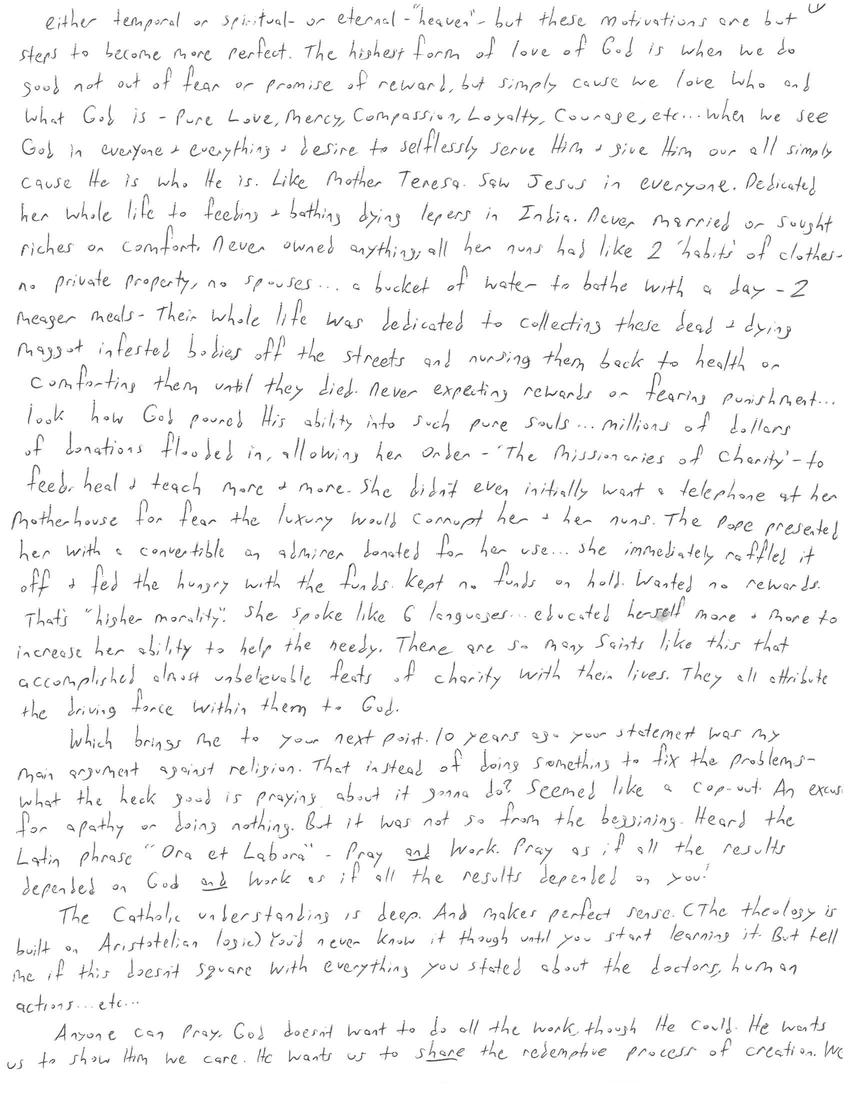
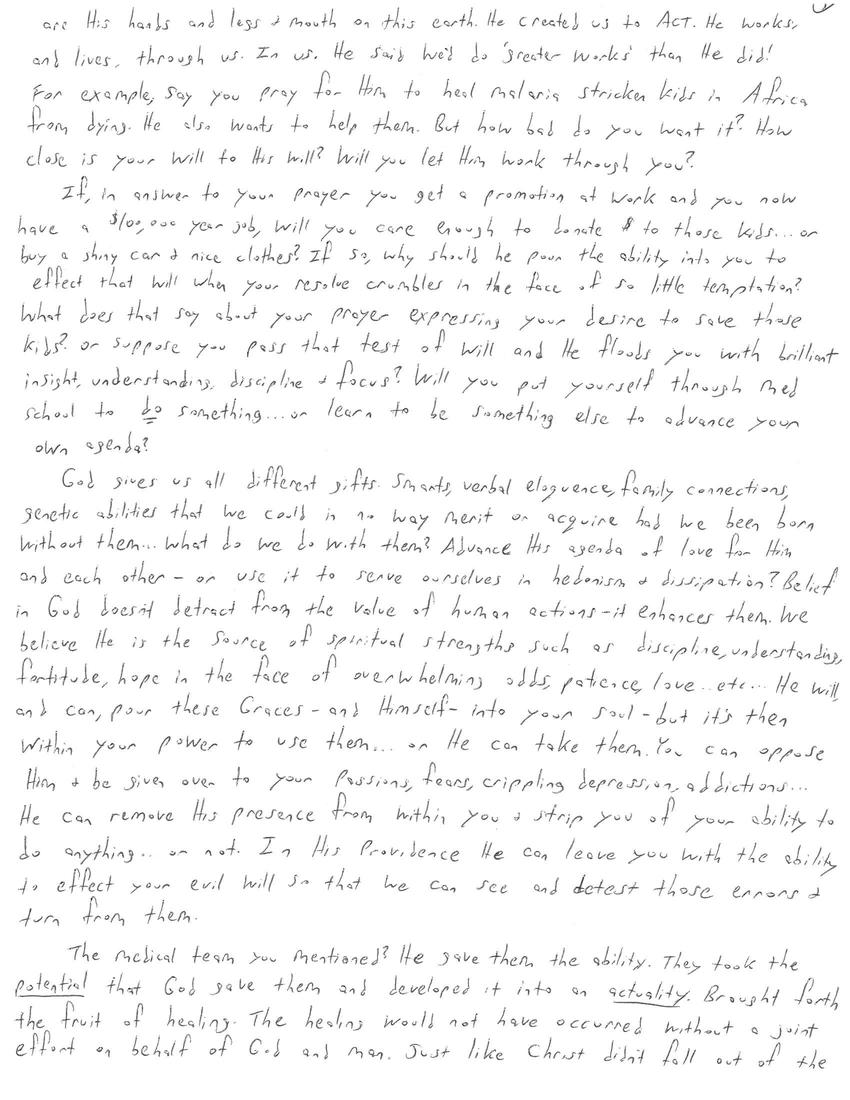
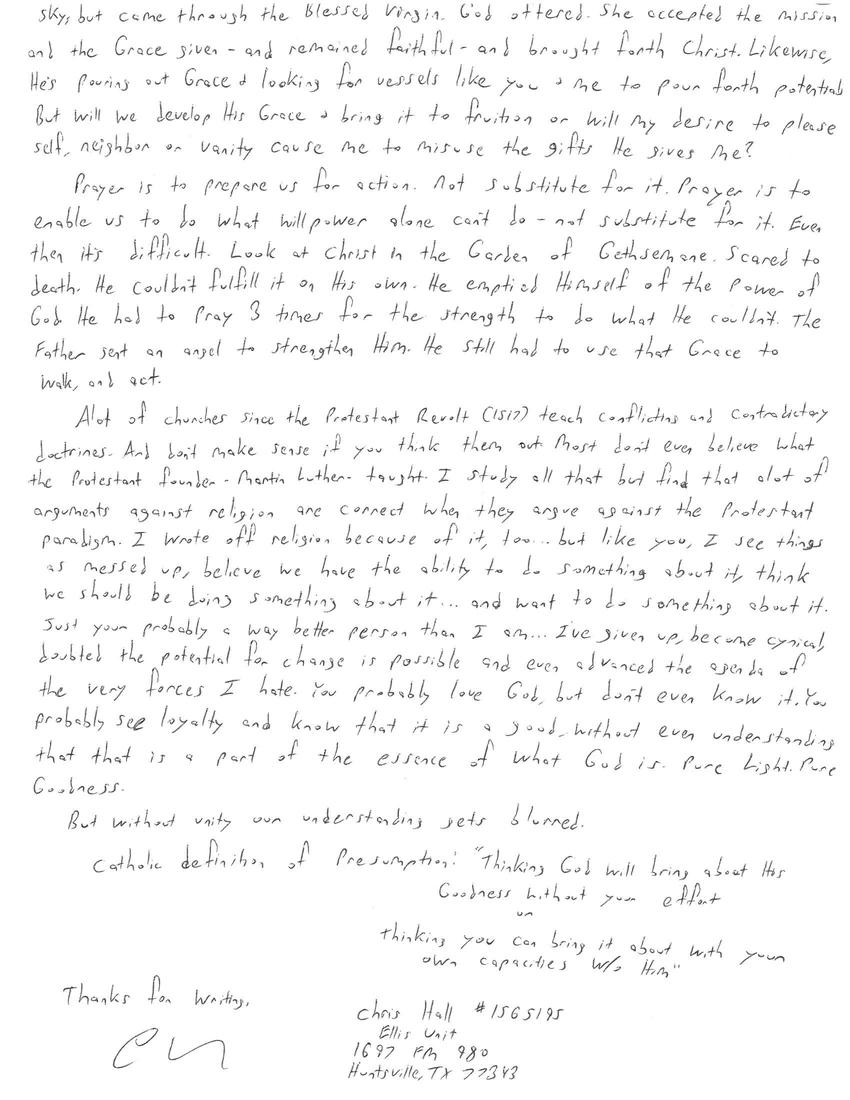

Replies (2)